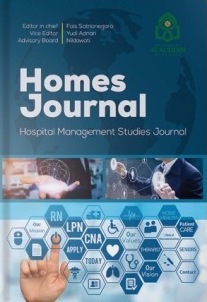OVERVIEW OF ORGANIZATIONAL CULTURE AT AN-NISA HOSPITAL TANGERANG
Bahasa Indonesia
Abstract
Background: Identifying organizational culture is crucial for an organization as it can boost overall productivity. Organizations in the economic, social, and educational sectors have extensively identified their cultures, but few hospitals in Indonesia have followed suit.
Objective: To determine the culture that is currently felt and preferred by employees at AN-NISA Hospital Tangerang.
Methods The research method used quantitative descriptive analysis by distributing questionnaires to 266 respondents who were permanent employees of AN-NISA Hospital Tangerang.
Result: The results of the study show that the current organizational culture at AN-NISA Hospital Tangerang is Clan, with an average of 38.42, and the preferred culture at AN-NISA Hospital Tangerang is Clan and Market, with an average of 27.11 and 25.49.
Conclusion: AN-NISA Hospital Tangerang will continue to consider the institution as a second home, family, and open to telling stories about themselves. However, AN-NISA Hospital Tangerang hopes to have leaders who can set an example as individuals who are serious, focused, aggressive, and results-oriented. Growth, innovation, and achievement of goals were aggressively developed to make AN-NISA Hospital Tangerang an excellent hospital among the others.
References
Asih, A. Y. P., Setianto, B., & Adriansyah, A. A. (2021). Analisis Budaya Organizational Culture Assesment Instrument (OCAI) pada Pejabat Struktural di RS Islam Surabaya. Jurnal Kesehatan Vokasional, 6(4), 200–207. https://doi.org/10.22146/jkesvo.70295
Asnany, Maidin, M. A., Mallongi, A., & Pasinring, S. A. (2022). Organizational Innovation Culture Model for Improving Health Material Service Performance in Police Hospitals:A Literature Review. Journal of Positive School Psychology, 6(4), 336–358. http://journalppw.com
Aziz, R. Z. A., Azima, M. F., & Irianto, S. Y. (2018). Development of Knowledge Management System for Determining Organizational Culture in Micro, Small, and Medium Enterprises using Organizational Culture Assessment Instrument. IOP Conference Series: Materials Science and Engineering, 403(1), 1–9. https://doi.org/10.1088/1757-899X/403/1/012078
Balková, M., & Jambal, T. (2023). Evaluation of Organizational Culture in Enterprises in the Czech Republic using OCAI. Frontiers in Psychology, 14, 1–11. https://doi.org/10.3389/fpsyg.2023.1297041
Boufounou, P., & Argyrou, M. D. (2022). Changing the Organizational Culture to Transform the Economy: The Case of Greece. Frontiers in Research Metric and Analytics, 7, 1–14. https://doi.org/10.3389/frma.2022.1050544
Cameron, K. S., & Freeman, S. J. (1991). Cultural Congruence, Strength, and Type: Relationships to Effectiveness. Research in Organizational Change and Development, 5, 23–58.
Cameron, K. S., & Quinn, R. E. (2006). Diagnosing and Changing Organizational Culture Based on the Competing Values Framework (Revised). The Jossey-Bass.
D’Silva, R., Balakrishnan, J. M., Bari, T., Verma, R., & Kamath, R. (2024). Unveiling the Heartbeat of Healing: Exploring Organizational Culture in a Tertiary Hospital’s Emergency Medicine Department and Its Influence on Employee Behavior and Well-Being. International Journal of Environmental Research and Public Health, 21(912), 1–24. https://doi.org/10.3390/ijerph21070912
Heritage, B., Pollock, C., & Roberts, L. (2014). Validation of the Organizational Culture Assessment Instrument. PLoS ONE, 9(3), 1–10. https://doi.org/10.1371/journal.pone.0092879
Huy, N. Van, Thu, N. T. H., Anh, N. L. T., Au, N. T. H., Phuong, N. T., Cham, N. T., & Minh, P. D. (2020). The Validation of Organisational Culture Assessment Instrument in Healthcare Setting: Results from a Cross-Sectional Study in Vietnam. BMC Public Health, 20(316), 1–8. https://doi.org/10.1186/s12889-020-8372-y
Idris, A. (2017). Penggunaan Organizational Culture Assessment Instrument pada Organisasi Non Formal. Jurnal Ekonomi Modernisasi, 13(2), 53–61. https://doi.org/10.21067/jem.v13i2.1767
Karimah, L., Wardani, R., Bastian, A., & Widiyanto, E. (2023). The Influence of Organizational Culture using The Ocai Approach on the Performance of Health Personnel at Intan Medika Lamongan Hospital. Journal of Hospital Management and Services, 5(2), 30–37. https://thejhms.org/index.php/JHMS
Nadirasetya, N. (2016). Analisis Budaya Organisasi menggunakan Metode Organizational Culture Assessment Instrument (OCAI) dan Pendekatan Fuzzy Linguistik [Undergraduate Thesis]. Universitas Brawijaya.
Nengsih, M. K., Pribowo, M. G. N. A., & Herfianti, M. (2023). Analisis Budaya Organisasi menggunakan Hofstede dan Organizational Culture Assessment Instrument (OCAI) (Studi Kasus pada Fakultas Ekonomi dan Bisnis Universitas Muhammadiyah Bengkulu). CRMJ: Creative Research Management Journal, 6(2), 88–98. https://doi.org/10.32663/0c114m09
Nuryanto, G. (2012). Pentingnya Budaya Organisasi terhadap Pertumbuhan Usaha Kecil Menengah (UKM) Kecamatan Cinere Depok Jawa Barat. UG Jurnal, 6(5), 15–18. https://ejournal.gunadarma.ac.id/index.php/ugjournal/article/viewFile/887/786
OCAI Online. (2019). Organizational Culture Assessment Instrument Company X.
Scammon, D. L., Tabler, J., Brunisholz, K., Gren, L. H., Kim, J., Tomoaia-Cotisel, A., Day, J., Farrell, T. W., Waitzman, N. J., & Magill, M. K. (2014). Organizational Culture Associated with Provider Satisfaction. Journal of the American Board of Family Medicine, 27(2), 219–228. https://doi.org/10.3122/jabfm.2014.02.120338
Schein, E. H. (1990). Organizational Culture: What it is and How to Change it. In P. Evans, Y. Doz, & A. Laurent (Eds.), Human Resource Management in International Firms: Change, Globalization, Innovation (pp. 56–82). Palgrave Macmillan UK. https://doi.org/10.1007/978-1-349-11255-5_4
Vermeulen, M., & Maas, K. (2020). Building Legitimacy and Learning Lessons: A Framework for Cultural Organizations to Manage and Measure the Social Impact of Their Activities. Journal of Arts Management Law and Society, 51(2), 97–112. https://doi.org/10.1080/10632921.2020.1851839
Wellem, I. (2019). Analisis Budaya Organisasi dengan menggunakan Metode Organizational Culture Assessment Instrument (OCAI) pada Perusahaan Daerah Air Minum (PDAM) Kabupaten Sikka. Jurnal Projemen UNIPA Maumere, 6(1), 1–22.


